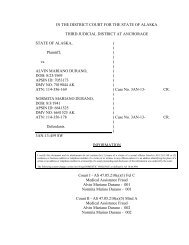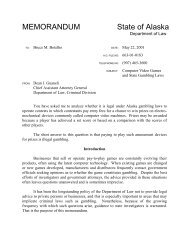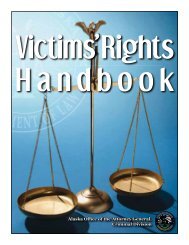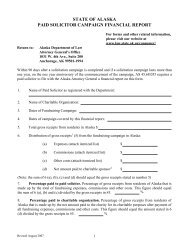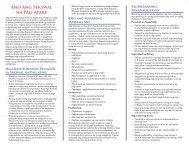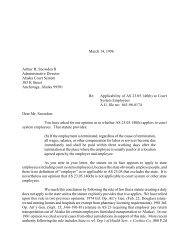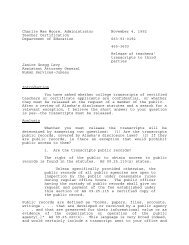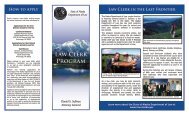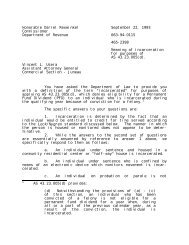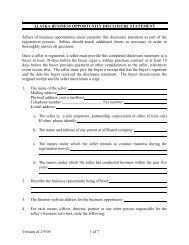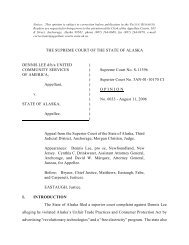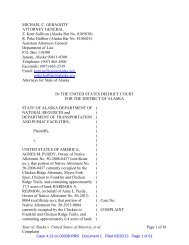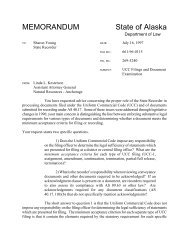Initial Report and Recommendations - Alaska Department of Law
Initial Report and Recommendations - Alaska Department of Law
Initial Report and Recommendations - Alaska Department of Law
- No tags were found...
Create successful ePaper yourself
Turn your PDF publications into a flip-book with our unique Google optimized e-Paper software.
continuous. Those who worked hardest to gather food <strong>and</strong> supplies had easier times than thosewho worked haphazardly, but <strong>of</strong> course, no one went hungry or without things they needed.These lazy ones were <strong>of</strong>ten visited by Elders <strong>and</strong> encouraged to do better next time.As children, we were watched <strong>and</strong> supervised by adults in the community. We werecorrected if we were to misbehave or act inappropriately. We were <strong>of</strong>ten fed by whicheverhousehold we happened to be at. If our parents or older siblings come looking for us, someonealways seemed to know where we’re at.The lifestyle in the villages has changed because <strong>of</strong> the influence <strong>of</strong> the Western worldthat came with their educational system, which has caused conflict with traditional family values.Of course the television brought the rest <strong>of</strong> the world into our homes, as have the <strong>Alaska</strong> NativeClaims Settlement Act, the Pipeline, Molly Hootch, 2 <strong>and</strong> all the other modern technology. Butour subsistence lifestyle has not changed except for the fact that the state <strong>and</strong> federal agencieshave brought their rules <strong>and</strong> regulations as to when we can hunt <strong>and</strong> fish. Some people from theOutside can’t seem to underst<strong>and</strong> why we need to harvest or the importance <strong>of</strong> the subsistencelifestyle.For me, living a subsistence lifestyle is the very essence <strong>of</strong> who I am as a Yup’ik woman.I have continued to cut <strong>and</strong> clean fish, caribou, moose, or other games as my mother <strong>and</strong>gr<strong>and</strong>mothers <strong>and</strong> aunts have done for centuries. And living in a village has given me a sense <strong>of</strong>belonging, a sense <strong>of</strong> who I am, which has sustained me to this day. Oftentimes today so manyNative people are misplaced, like in the cities they become homeless, <strong>of</strong> course looking forcompany, or when they get lonesome they <strong>of</strong>ten end up in places where it’s not safe for them, <strong>and</strong>usually they end up drinking <strong>and</strong> drugging. People seem to have lost their sense <strong>of</strong> who they are<strong>and</strong> where they come from, or many <strong>of</strong> them have never learned, because they were placed infoster homes as children, <strong>and</strong> I think those are the people <strong>of</strong>tentimes who are very lost, becausethey have no sense <strong>of</strong> identity.I remember the time when I went back to Bethel, <strong>and</strong> during that time I reconnected withmy Elders <strong>and</strong> my people. I got back into that way <strong>of</strong> living again, even though it wasmodernized, but I still had that essence <strong>of</strong> who I was, who I had come from, <strong>and</strong> where Ibelonged. My children <strong>and</strong> I lived there for eight years, <strong>and</strong> while we lived there my children gotto know their relatives, all their relatives that were around. And what we did was, we built acommunity, a support system that was very satisfying, <strong>and</strong> my children recall those were thehappy times. I mean life was hard, but in all it was a pretty good life.Then in 1985 we moved to Anchorage to continue my college education. The first twoyears were a very hard time for us, because we no longer had that support system like we did inBethel. Even though we had friends <strong>and</strong> relatives, they were all scattered throughout the city, <strong>and</strong>everybody was rushing, working, <strong>and</strong> too busy even to take the time to visit. So we really didn’thave that support system any more. It was a very difficult period. I think the first three or fouryears, <strong>and</strong> I think my children suffered from that, <strong>and</strong> to this day I’m really sorry that I broughtthem into the city. I think we would have been better <strong>of</strong>f living in the village or living in Bethel.So that’s what happens a lot <strong>of</strong> times to people who move into a city. There’s no – in the citieswe lose that connectedness to other human beings. It’s very lonely living in a city, there are allkinds <strong>of</strong> people around us, but it’s a very lonely time.2See http://www.alaskool.org/native_ed/law/mhootch_erq.html for information on this important courtcase that brought schools to most <strong>of</strong> <strong>Alaska</strong>’s rural villages.<strong>Alaska</strong> Rural Justice <strong>and</strong> <strong>Law</strong> Enforcement Commission - Page 2




